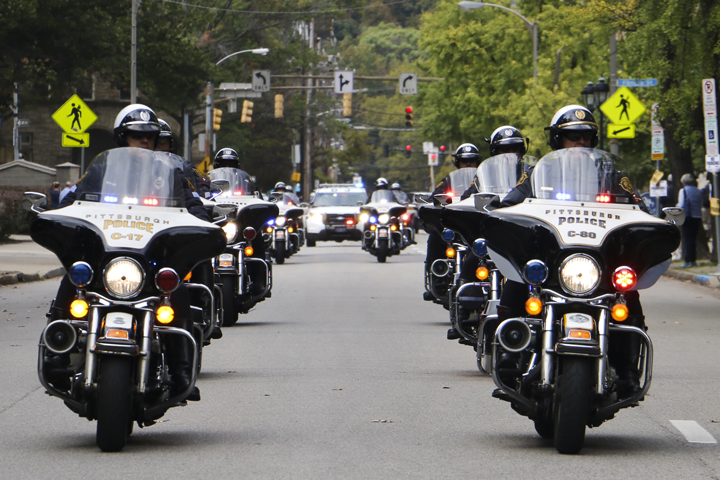Editorial: Pittsburgh police should live in communities they serve


Pittsburgh Police escort President Obama through Pitt's campus| John Hamilton, Senior Staff Photographer
Communities work best when residents have a vested interest in each others’ happiness and safety.
Pittsburghers seemed to recognize that fact in 2013, when 80 percent of residents voted for a referendum to the Home Rule Charter that would require city employees to live within the city limits.
A year later, an arbitration panel ruled that city police officers could live within 25 miles of Downtown, a large radius that extends even beyond the Allegheny county limits entirely. But that decision was thrown out in April 2015 by the Commonwealth Court, an appellate court that hears cases involving local governments agencies.
Now, the issue is in the news again. Yesterday, the Pennsylvania Supreme Court heard arguments from the Fraternal Order of Police and lawyers representing the city on whether the 25-mile radius rule should exist. The FOP wants the radius so officers have more freedom to choose their residency, while the city contends that the public referendum should hold.
The court should back the will of the people and uphold the referendum. While police officers do a necessary service and are entitled to the same freedoms we all enjoy, there are clear benefits to placing people in the communities they serve and protect. Every other city employee has to meet a residency requirement — the police should be no exception.
A key criticism against residency requirements is that it can be difficult to support life in a growing city on a public salary. But other city employees face that same problem, many earning less than the starting officer salary of $40,896.
The past several years of heightened criticism against police centers around the perception that officers don’t care about the people they are protecting. There’s a lack of trust between community members and officers because there’s little common-ground contact between each side.
And since Police Chief Cameron McLay has made community policing a focus, eliminating the residency requirement would be counterproductive to his plans.
Most police officers don’t walk beats anymore, they sit in squad cars. There’s very little reason for these officers to interact with the people around them unless they receive a call to do so.
Hostile tones, a lack of speedy response, reciprocated biases between authority figures and minority communities — these factors lead to police forces that function as attack dogs rather than guard dogs and citizens who hesitate before calling for help because they don’t know who’s going to arrive.
But if the neighborhood cop lives next door, families might feel more comfortable calling her for support — or communicating with her when they’ve run into trouble.
Perhaps the biggest problem affecting Pittsburgh’s police department is the lack of diversity. While a residency requirement wouldn’t address this issue specifically, putting people of diverse backgrounds in regular contact with one another is a benefit for everyone involved.
The city relies on its police to protect its citizens, and those citizens decided its employees should have a stake in their communities. A 25-mile radius does not fulfill that request.
If officers care enough about this city to defend it each and every day, they should be equally willing to be a part of it.
Recent Posts
Photo: Fetterman Protest
Attendees gathered in Schenley Plaza to protest Sen. John Fetterman, D-Pa., on Saturday, March 29.…
Photos: Pitt Women’s Soccer v. Youngstown State
Pitt women’s soccer competes against Youngstown State at Ambrose Urbanic Field on Saturday, March 29.…
Photos: Noh Movement and Chant Workshop
Students attend a Noh Movement and Chant Workshop led by professional Noh performers Hisa and…
‘He’s off to a much faster and better start’: Republicans reflect the second Trump administration’s first two months
Since Inauguration Day Trump’s second term has caused division amongst young Americans. Despite these controversies,…
Who Asked? // Why do we accept bad treatment from people?
This installment of Who Asked? by staff writer Brynn Murawski attempts to untangle the complicated…
What, Like It’s Hard? // Lean on your people
Contributing editor Livia LaMarca talks about leaning on your support networks and gives advice on…


